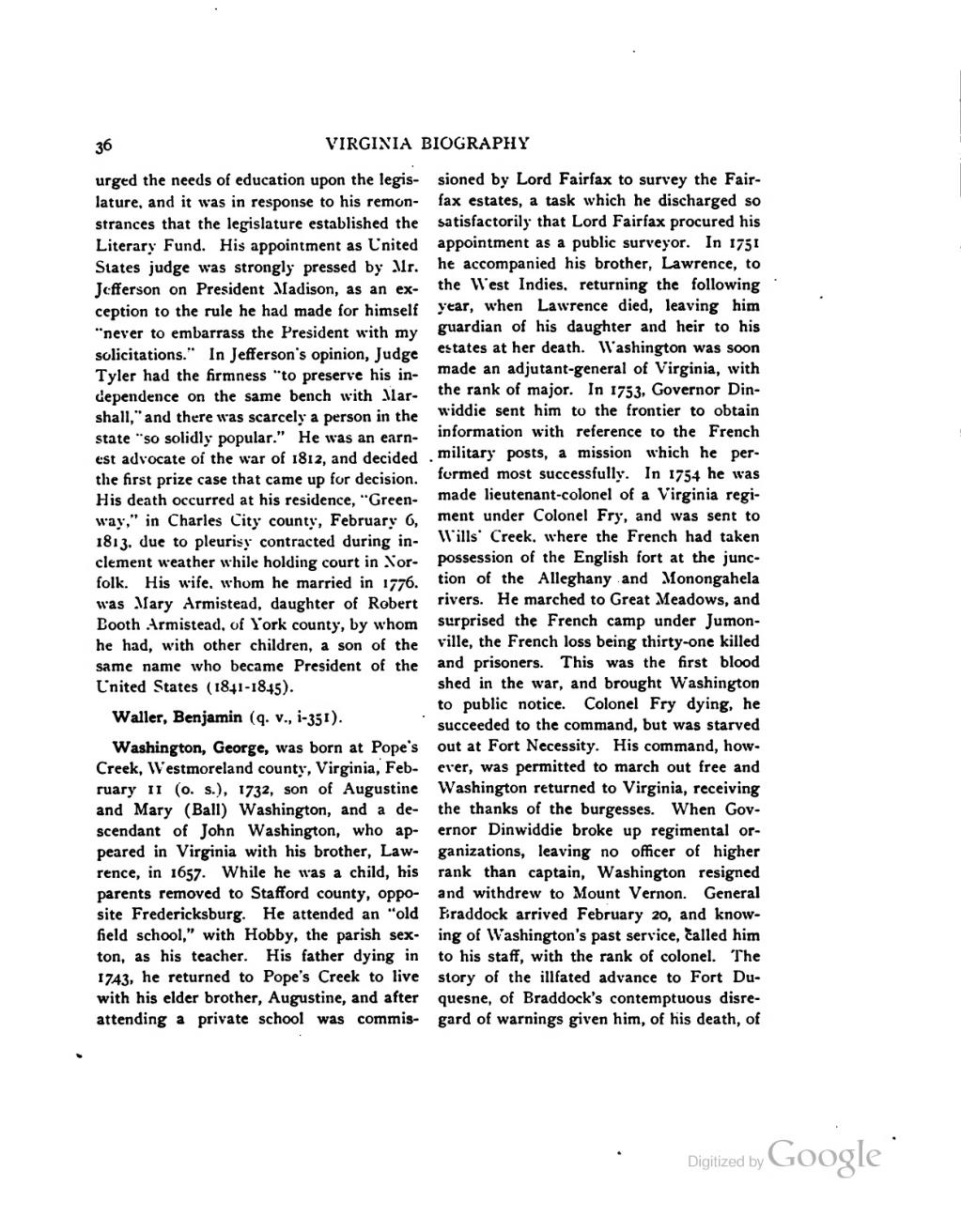36
VIRGINIA BIOGRAPHY
urged the needs of education upon the legis-
lature, and it was in response to his remon-
strances that the legislature established the
Literary Fund. His appointment as United
States judge was strongly pressed by Mr.
Jefferson on President Madison, as an ex-
ception to the rule he had made for himself
"never to embarrass the President with my
solicitations." In Jefferson's opinion, Judge
Tyler had the firmness "to preserve his in-
dependence on the same bench with Mar-
shall/* and there was scarcely a person in the
state "so solidly popular.*' He was an earn-
est advocate of the war of 1812, and decided
the first prize case that came up for decision.
His death occurred at his residence, "Green-
way," in Charles City county, February 6,
1813, due to pleurisy contracted during in-
clement weather while holding court in Nor-
folk. His wife, whom he married in 1776.
was Mary Armistead, daughter of Robert
Booth .Armistead, of York county, by whom
he had, with other children, a son of the
same name who became President of the
United States (1841-1845).
Waller, Benjamin (q. v., 1-351).
Washington, George, was born at Pope's Creek, Westmoreland county, Virginia, Feb- ruary II (o. s.), 1732, son of Augustine and Mary (Ball) Washington, and a de- scendant of John Washington, who ap- peared in Virginia with his brother, Law- rence, in 1657. While he was a child, his parents removed to Stafford county, oppo- site Fredericksburg. He attended an **old field school," with Hobby, the parish sex- ton, as his teacher. His father dying in 1743, he returned to Pope's Creek to live with his elder brother, Augustine, and after attending a private school was commis-
sioned by Lord Fairfax to survey the Fair-
fax estates, a task which he discharged so
satisfactorily that Lord Fairfax procured his
appointment as a public surveyor. In 1751
he accompanied his brother, Lawrence, to
the West Indies, returning the following
year, when Lawrence died, leaving him
guardian of his daughter and heir to his
estates at her death. Washington was soon
made an adjutant-general of Virginia, with
the rank of major. In 1753, Governor Din-
widdie sent him to the frontier to obtain
information with reference to the French
^ military posts, a mission which he per-
formed most successfully. In 1754 he was
made lieutenant-colonel of a Virginia regi-
ment under Colonel Fry, and was sent to
Wills' Creek, where the French had taken
possession of the English fort at the junc-
tion of the Alleghany and Monongahela
rivers. He marched to Great Meadows, and
surprised the French camp under Jumon-
ville, the French loss being thirty-one killed
and prisoners. This was the first blood
shed in the war, and brought Washington
to public notice. Colonel Fry dying, he
succeeded to the command, but was starved
out at Fort Necessity. His command, how-
ever, was permitted to march out free and
Washington returned to Virginia, receiving
the thanks of the burgesses. When Gov-
ernor Dinwiddie broke up regimental or-
ganizations, leaving no officer of higher
rank than captain, Washington resigned
and withdrew to Mount Vernon. General
P»raddock arrived February 20, and know-
ing of Washington's past service, called him
to his staff, with the rank of colonel. The
story of the ill fated advance to Fort Du-
quesne, of Braddock's contemptuous disre-
gard of warnings g^ven him, of his death, of
Digitized by
Google
